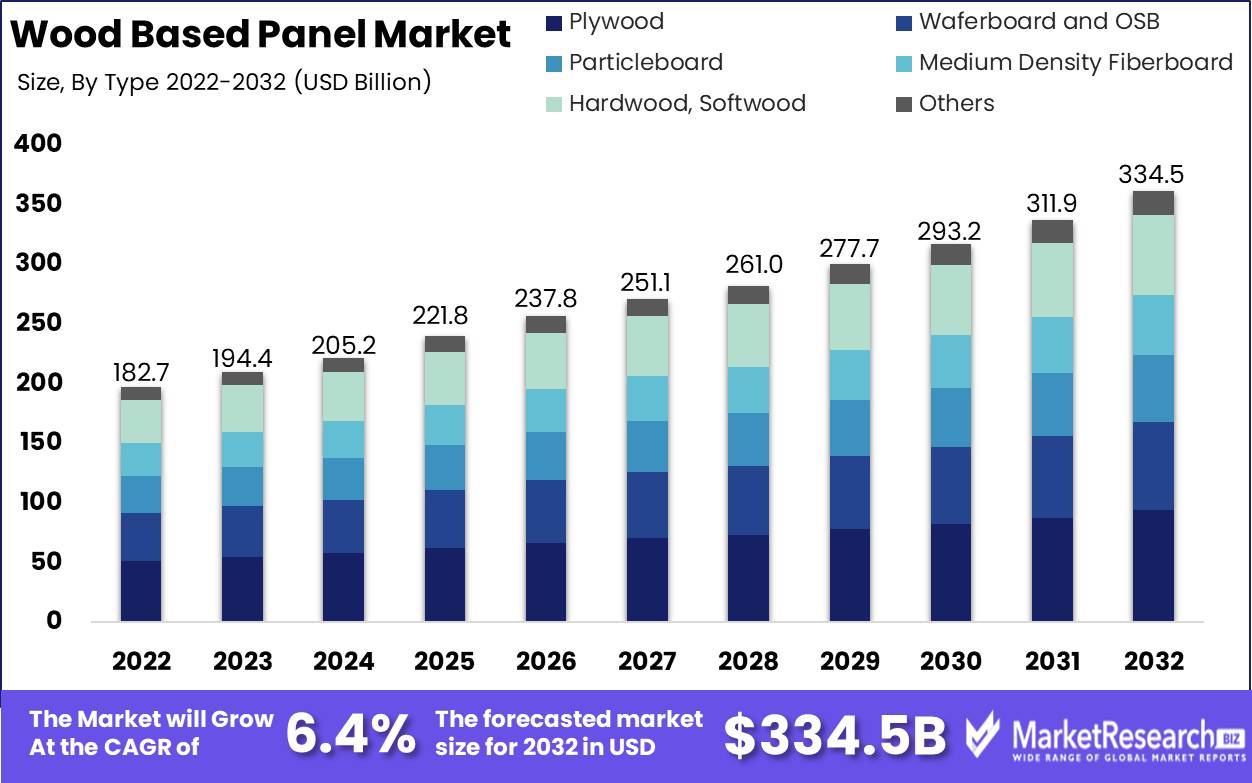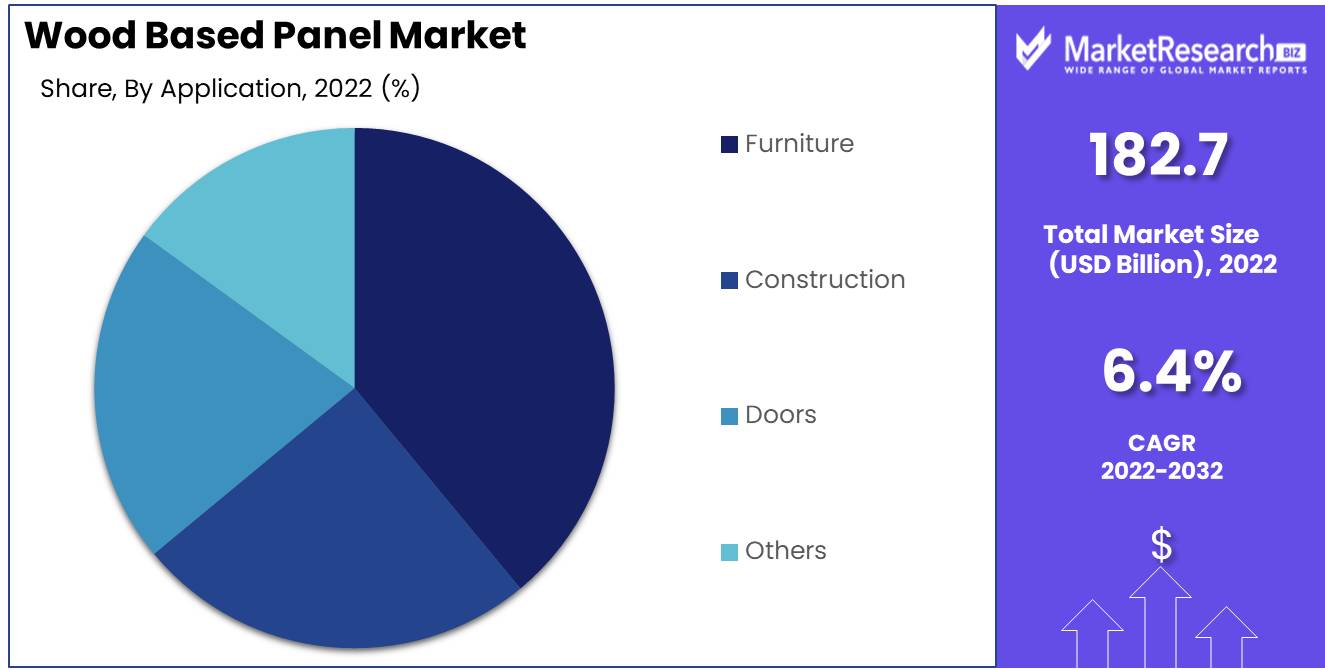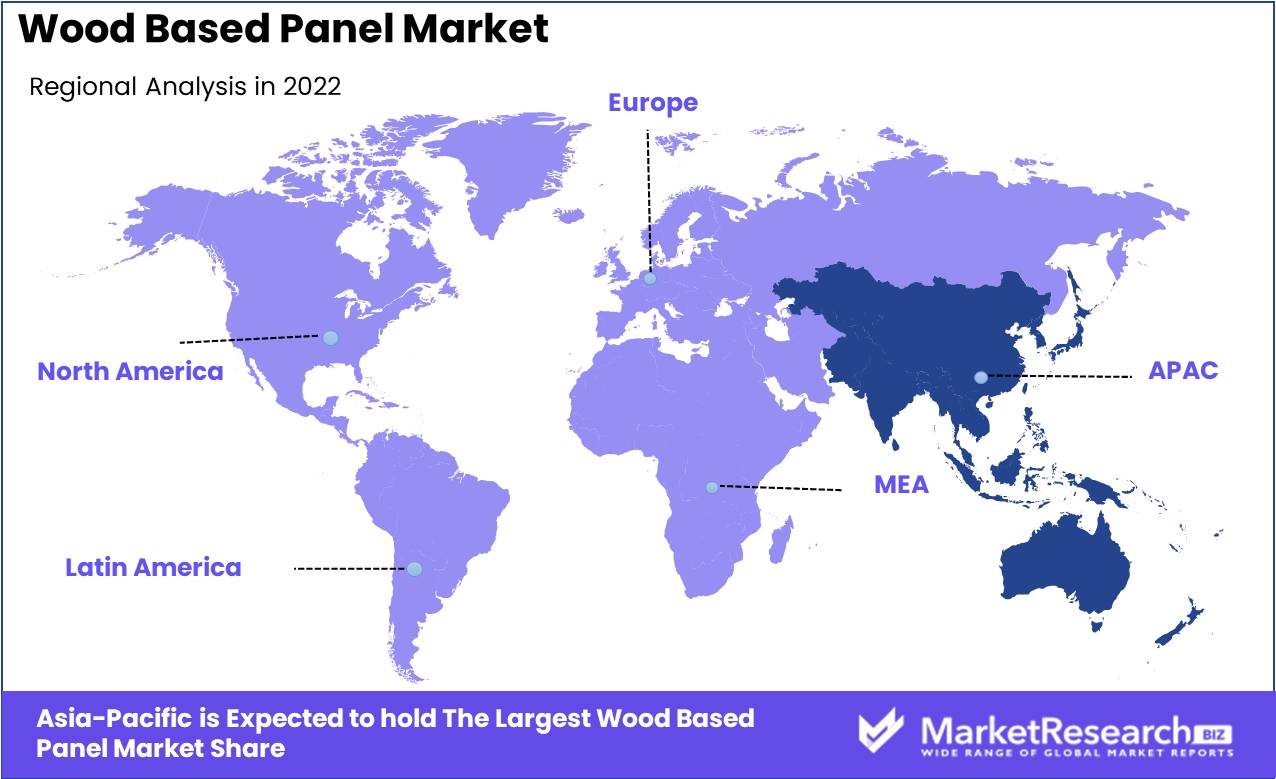
Wood Based Panel Market By Type(Plywood, Waferboard and OSB, Particleboard, Medium Density Fiberboard, Hardwood, Softwood, Others), By Application(Furniture, Construction, Doors, Others), By Region And Companies - Industry Segment Outlook, Market Assessment, Competition Scenario, Trends, And Forecast 2023-2032
-
2535
-
Jul 2023
-
142
-
-
This report was compiled by Correspondence Linkedin | Detailed Market research Methodology Our methodology involves a mix of primary research, including interviews with leading mental health experts, and secondary research from reputable medical journals and databases. View Detailed Methodology Page
-
Report Overview
Wood Based Panel Market size is expected to be worth around USD 334.5 Bn by 2032 from USD 182.7 Bn in 2022, growing at a CAGR of 6.4% during the forecast period from 2023 to 2032.
The expanding wood-based panels market has garnered considerable attention over the years due to their diverse applications. These composite materials, made from a combination of wood shavings, sawdust, and other wood-based products, are acquiring tremendous popularity in the construction industry, where they are used for flooring, roofing, and wall panels. The wood-based panels market has expanded exponentially due to the numerous advantages they offer in comparison to conventional materials.

The expansion of the wood-based panel industry has been relatively stable in recent years, with no indications of slowing down in the near future. This report provides a comprehensive overview of the industry, including its definition, objectives, significance, and benefits.
In addition, the report explores the various innovations, enormous investments, incorporation into products/services, market growth and applications, as well as the industries that are investing in the industry.
Wood-based panels are manufactured from wood fragments, sawdust, and other wood-based materials. Increasingly, these adaptable panels are being used in a variety of construction applications. Strength, durability, and affordability are just a few of the many benefits of wood-based panel materials over conventional ones. The global wood-based panels market is expanding, presenting numerous investment opportunities for those who are interested.
Driving factors
Green building practices
Another factor that has contributed to the expansion of the wood-based panel market is the increasing popularity of green building practices. As individuals become more environmentally conscious, there is a growing preference for eco-friendly construction materials. Due to their renewable sources and minimal carbon footprint, wood-based panels are viewed as a more eco-friendly option than traditional building materials, resulting in their increasing adoption.
Industry of Construction and Urbanization
The prospering construction industry and urbanization have also played a significant role in the expansion of the wood-based panels market. The increase in economic activity and urbanization has led to an increase in construction activities, which in turn has increased the demand for building materials, such as wood-based panels. As a consequence, the wood-based panels market has exhibited an upward trend.
Durability and environmental tolerance
Sustainability and environmental tolerance have also contributed to the popularity of wood-based panels. In a world where environmental concerns continue to grow, an increasing number of consumers prefer eco-friendly products. Because wood-based panels are manufactured from renewable resources and are recyclable, they are a more sustainable option than traditional building materials, and therefore more appealing to environmentally conscious consumers.
Emerging technologies
Emerging technologies such as augmented reality and 3D printing may also have an effect on the wood-based panels market. These technologies have the potential to revolutionize the design and construction of buildings; consequently, they could affect the demand for wood-based panels.
Restraining Factors
Uncertainty in the Cost of Raw Materials
Uncertainty in the values of basic materials is one of the greatest obstacles confronting the wood-based panel industry. Fluctuations in the prices of basic materials such as wood chips, logs, and cellulose can have an effect on a company's overall profitability. These price fluctuations are frequently influenced by external factors such as weather, harvests, and global demand. To mitigate the impact of fluctuating raw material costs on our business, we invest in long-term supplier relationships that provide stable pricing and supply. In addition, we actively analyze the market to anticipate trends and modify our raw material procurement accordingly.
Strict Governmental Requirements
The wood-based panels market is also impacted by stringent government regulations mandating compliance with environmental and safety standards. These regulations can lead to increased expenses and time-consuming compliance procedures. To overcome these obstacles, we continue to invest in new technologies and equipment that reduce our environmental impact, boost our energy efficiency, and enhance worker safety. Additionally, we collaborate closely with regulatory agencies to remain abreast of the most recent requirements and ensure compliance.
Product Analysis
The wood-based panels market is highly competitive and dynamic, with numerous segments. The Plywood Segment dominates the market share among these segments. Plywood is a versatile and cost-effective engineered wood product produced by adhering thin layers of wood veneers together under high pressure and heat. The resulting sheet material is robust, long-lasting, and resistant to deformation and cracking, making it suitable for a variety of applications.
In recent years, the demand for the Plywood Segment has increased consistently for a variety of reasons. The economic growth of emerging societies is one of the most influential factors propelling the adoption of the Plywood Segment. The accelerated growth of emerging economies such as India, China, and Brazil has increased demand for housing, infrastructure, and commercial structures. Consequently, the demand for Plywood Segment in these nations has been consistently increasing.
Application Analysis
The Furniture Segment is another significant segment of the wood-based panel market. Wood-based panels are the preferred material for creating furniture. Furniture is a necessity in all residential, commercial, and institutional settings. Particleboard, MDF, and Plywood are the most commonly used wood-based panels in the furniture industry.
Similar to the Plywood Segment, economic growth in emerging economies drives the Furniture Segment's adoption. As the purchasing power of consumers in these nations rises, the steady increase in demand for furniture continues. In addition, the trend of home renovation and interior design is gathering momentum, resulting in an increase in demand for enhanced and aesthetically appealing furniture.

Key Market Segments
By Type
- Plywood
- Waferboard and OSB
- Particleboard
- Medium Density Fiberboard
- Hardwood, Softwood
- Others
By Application
- Furniture
- Construction
- Doors
- Others
Growth Opportunity
E-commerce
The wood-based panels market is quickly becoming more accessible to customers who shop online. The proliferation of the practice of buying online is the primary factor driving expansion in this market. The demand for wood-based panels in online retail is growing as a result of an increased number of businesses shifting their sales strategy to include online channels.
Health and Wellness
There has been an uptick in customers looking for items that are both safe and kind to the environment. As a result, the wood-based panels market is seeing expansion, which is being pushed by the rising demand for environmentally friendly goods. It is anticipated that the wood-based panels market will continue to see expansion as a result of the utilization of environmentally friendly materials and techniques.
Renewable Energy
The business that manufactures panels made of wood is progressively adopting renewable forms of energy. The expansion of the market is being driven by this adoption. For example, the use of biomass energy in the production of wood-based panels is gained significant traction in recent years. This pattern has resulted in lower costs while also leading to an improvement in the panels' overall quality.
Latest Trends
Availability of Abundant and Renewable Raw Materials
The availability of numerous renewable raw materials gives wood-based panels a substantial advantage over other traditional building materials such as steel or concrete. This is because wood is a naturally abundant and renewable resource. Construction businesses that are worried about their carbon footprint may find the use of wood to be an appealing alternative since it is a material that is both ecologically friendly and sustainable. It can be obtained from forests that are maintained responsibly. Compared to other materials on the market, wood-based panels are energy-efficient and offer excellent insulating capabilities.
Fluctuations in the price of conventional building materials
The price of conventional building materials such as concrete and steel has been climbing steadily over the past several years, which has prompted the construction industry to search for less expensive alternative building materials. As a result of their affordable pricing and favorable cost-benefit ratio, panels made of wood-based materials have emerged as a feasible choice in recent years. Wood-based panels are an appealing option for building firms due to their low cost, high quality, and positive environmental impact.
Growing prevalence of the use of panels based on wood in interior design and furnishings
Because of their adaptability and high level of quality, wood-based panels are finding more and more applications in the fields of interior design and furniture. They have a one-of-a-kind visual appeal that may be molded and fashioned by a wide variety of design motifs and styles. Because wood-based panels can be fabricated into a wide variety of shapes and dimensions, they are ideally suited for use in the production of bespoke furniture and fittings that enhance the aesthetic appeal of residential and commercial interiors.
Low Maintenance and Fire-Resistant Building Materials are in high demand
Particularly in areas that are prone to wildfires and natural calamities, low-maintenance and fire-resistant building materials are becoming more and more popular. As a result of their low maintenance requirements and high resistance to fire, panels made of wood-based materials are a popular choice among building businesses working in regions with such vulnerabilities.
Regional Analysis
The Asia Pacific region is home to a number of quickly expanding markets that have made a substantial contribution to the expansion of several sectors, including healthcare, automotive, and construction. Another aspect that has spurred the expansion of numerous industries and raised demand for products and services is the region's rapidly growing population.
The healthcare industry is one of the sectors that has grown incredibly quickly in the Asia Pacific region. The demand for medical devices and equipment, including surgical equipment, patient monitoring devices, and other items, has expanded as a result of the region's expanding population and better access to healthcare services.
The Asia Pacific region's automobile sector has grown steadily in recent years as well. The growing demand for autos in developing nations like India, China, and Japan is blamed for this tendency. The region's rapidly expanding urban population has also increased demand for personal mobility, fueling the expansion of the automobile industry.

Key Regions and Countries
North America
- US
- Canada
- Mexico
Western Europe
- Germany
- France
- The UK
- Spain
- Italy
- Portugal
- Ireland
- Austria
- Switzerland
- Benelux
- Nordic
- Rest of Western Europe
Eastern Europe
- Russia
- Poland
- The Czech Republic
- Greece
- Rest of Eastern Europe
APAC
- China
- Japan
- South Korea
- India
- Australia & New Zealand
- Indonesia
- Malaysia
- Philippines
- Singapore
- Thailand
- Vietnam
- Rest of APAC
Latin America
- Brazil
- Colombia
- Chile
- Argentina
- Costa Rica
- Rest of Latin America
Middle East & Africa
- Algeria
- Egypt
- Israel
- Kuwait
- Nigeria
- Saudi Arabia
- South Africa
- Turkey
- United Arab Emirates
- Rest of MEA
Key Players Analysis
The global wood-based panels market is extremely competitive, with key participants constantly innovating their technologies and concentrating on expanding their market presence. Kronospan Holdings Ltd, West Fraser Timber Co. Ltd, Norbord Inc., Georgia-Pacific LLC, Arauco, Egger Group, Weyerhaeuser Company, Louisiana-Pacific Corporation, Shanghai JuFu Industries Co. Ltd, and Dongha Singapore are some of the main market participants. These businesses offer a variety of wood-based panels, including plywood, particleboard, medium-density fiberboard (MDF), and oriented strand board (OSB), to meet the needs of a broad spectrum of applications.
Kronospan Holdings Ltd is the world's foremost producer of MDF and chipboards, with production facilities in over 40 countries. North America's largest producer of plywood and lumber is West Fraser Timber Co. Ltd, while Norbord Inc. is the world's largest producer of OSB. Georgia-Pacific LLC is a significant market participant that offers a variety of products including plywood, MDF, OSB, and engineered wood. Arauco has a substantial presence in South America, where it manufactures MDF, particleboard, and plywood.
Egger Group is a prominent European manufacturer of a variety of wood-based products, including furniture, flooring, and construction materials. Weyerhaeuser Company, based in the United States, manufactures OSB, plywood, and engineered timber. Louisiana-Pacific Corporation is another U.S.-based manufacturer of OSB and sheathing. MDF, particleboard, and plywood are all manufactured by Shanghai JuFu Industries Co. Ltd, a Chinese corporation. Dongwha Singapore is a corporation based in South Korea that manufactures MDF and particleboard products.
Top Key Players in Wood Based Panel Market
- Norbord Inc.
- Kronospan Limited
- West Fraser Timber Co. Ltd.
- Timber Products Company
- Weyerhaeuser Company
- Georgia-Pacific LLC
- Bucina DDD, spol. s r.o. (Ltd.)
- Sonae Indústria
- Freres Lumber Co., Inc.
- Dongwha Enterprise Co., Ltd.
- Kastamonu Entegre
- Hampton Affiliates
- Duratex
Recent Development
- In June 2022, Kronoplus announced that it had invested EUR 400 million (USD 473.26 million) in a new manufacturing facility for wood-based panels in Tortosa, Spain. This facility is expected to produce 720,000 cubic meters of wood-based panels annually and will occupy an impressive 25 hectares. This expansion demonstrates that Kronoplus has ambitious intentions for the wood-based panels market and is prepared to make substantial investments in new manufacturing facilities to realize them.
- In September 2022, LP Building Solutions expanded its production capabilities by converting and expanding its New Limerick, Maine facility to manufacture LP SmartSide Trim and Siding. This expansion represents a major stride forward for the company, which aims to increase its production capacity to satisfy the rising demand for wood-based panels.
Report Scope
Report Features Description Market Value (2022) USD 182.7 Bn Forecast Revenue (2032) USD 334.5 Bn CAGR (2023-2032) 6.4% Base Year for Estimation 2022 Historic Period 2016-2022 Forecast Period 2023-2032 Report Coverage Revenue Forecast, Market Dynamics, COVID-19 Impact, Competitive Landscape, Recent Developments Segments Covered By Type(Plywood, Waferboard and OSB, Particleboard, Medium Density Fiberboard, Hardwood, Softwood, Others), By Application(Furniture, Construction, Doors, Others) Regional Analysis North America – The US, Canada, & Mexico; Western Europe – Germany, France, The UK, Spain, Italy, Portugal, Ireland, Austria, Switzerland, Benelux, Nordic, & Rest of Western Europe; Eastern Europe – Russia, Poland, The Czech Republic, Greece, & Rest of Eastern Europe; APAC – China, Japan, South Korea, India, Australia & New Zealand, Indonesia, Malaysia, Philippines, Singapore, Thailand, Vietnam, & Rest of APAC; Latin America – Brazil, Colombia, Chile, Argentina, Costa Rica, & Rest of Latin America; Middle East & Africa – Algeria, Egypt, Israel, Kuwait, Nigeria, Saudi Arabia, South Africa, Turkey, United Arab Emirates, & Rest of MEA Competitive Landscape Norbord Inc., Kronospan Limited, West Fraser Timber Co. Ltd., Timber Products Company, Weyerhaeuser Company, Georgia-Pacific LLC, Bucina DDD, spol. s r.o. (Ltd.), Sonae Indústria, Freres Lumber Co., Inc., Dongwha Enterprise Co., Ltd., Kastamonu Entegre, Hampton Affiliates, Duratex Customization Scope Customization for segments, region/country-level will be provided. Moreover, additional customization can be done based on the requirements. Purchase Options We have three licenses to opt for: Single User License, Multi-User License (Up to 5 Users), Corporate Use License (Unlimited User and Printable PDF) -
-
- Norbord Inc.
- Kronospan Limited
- West Fraser Timber Co. Ltd.
- Timber Products Company
- Weyerhaeuser Company
- Georgia-Pacific LLC
- Bucina DDD, spol. s r.o. (Ltd.)
- Sonae Indústria
- Freres Lumber Co., Inc.
- Dongwha Enterprise Co., Ltd.
- Kastamonu Entegre
- Hampton Affiliates
- Duratex




